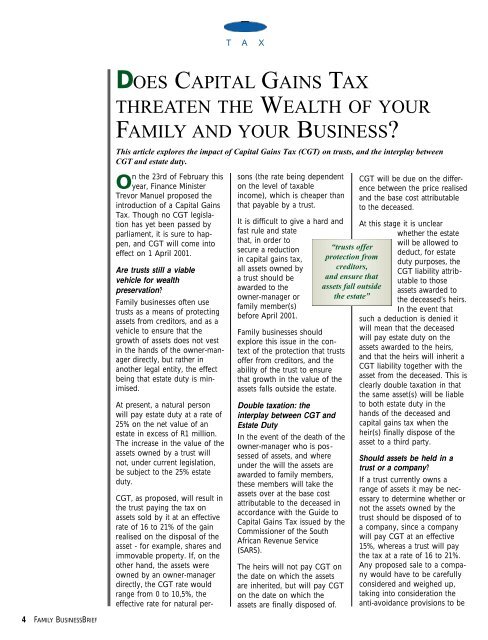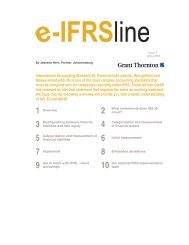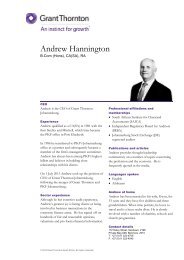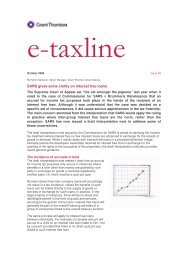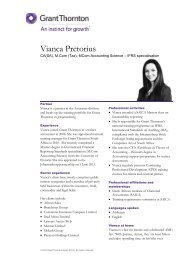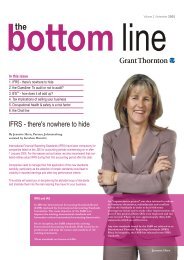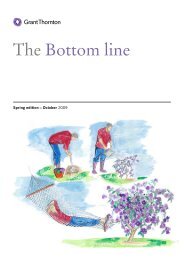FAMILY - Grant Thornton
FAMILY - Grant Thornton
FAMILY - Grant Thornton
You also want an ePaper? Increase the reach of your titles
YUMPU automatically turns print PDFs into web optimized ePapers that Google loves.
T A X<br />
DOES CAPITAL GAINS TAX<br />
THREATEN THE WEALTH OF YOUR<br />
<strong>FAMILY</strong> AND YOUR BUSINESS<br />
This article explores the impact of Capital Gains Tax (CGT) on trusts, and the interplay between<br />
CGT and estate duty.<br />
On the 23rd of February this<br />
year, Finance Minister<br />
Trevor Manuel proposed the<br />
introduction of a Capital Gains<br />
Tax. Though no CGT legislation<br />
has yet been passed by<br />
parliament, it is sure to happen,<br />
and CGT will come into<br />
effect on 1 April 2001.<br />
Are trusts still a viable<br />
vehicle for wealth<br />
preservation<br />
Family businesses often use<br />
trusts as a means of protecting<br />
assets from creditors, and as a<br />
vehicle to ensure that the<br />
growth of assets does not vest<br />
in the hands of the owner-manager<br />
directly, but rather in<br />
another legal entity, the effect<br />
being that estate duty is minimised.<br />
At present, a natural person<br />
will pay estate duty at a rate of<br />
25% on the net value of an<br />
estate in excess of R1 million.<br />
The increase in the value of the<br />
assets owned by a trust will<br />
not, under current legislation,<br />
be subject to the 25% estate<br />
duty.<br />
CGT, as proposed, will result in<br />
the trust paying the tax on<br />
assets sold by it at an effective<br />
rate of 16 to 21% of the gain<br />
realised on the disposal of the<br />
asset - for example, shares and<br />
immovable property. If, on the<br />
other hand, the assets were<br />
owned by an owner-manager<br />
directly, the CGT rate would<br />
range from 0 to 10,5%, the<br />
effective rate for natural per-<br />
sons (the rate being dependent<br />
on the level of taxable<br />
income), which is cheaper than<br />
that payable by a trust.<br />
It is difficult to give a hard and<br />
fast rule and state<br />
that, in order to<br />
secure a reduction<br />
in capital gains tax,<br />
all assets owned by<br />
a trust should be<br />
awarded to the<br />
owner-manager or<br />
family member(s)<br />
before April 2001.<br />
Family businesses should<br />
explore this issue in the context<br />
of the protection that trusts<br />
offer from creditors, and the<br />
ability of the trust to ensure<br />
that growth in the value of the<br />
assets falls outside the estate.<br />
Double taxation: the<br />
interplay between CGT and<br />
Estate Duty<br />
In the event of the death of the<br />
owner-manager who is possessed<br />
of assets, and where<br />
under the will the assets are<br />
awarded to family members,<br />
these members will take the<br />
assets over at the base cost<br />
attributable to the deceased in<br />
accordance with the Guide to<br />
Capital Gains Tax issued by the<br />
Commissioner of the South<br />
African Revenue Service<br />
(SARS).<br />
The heirs will not pay CGT on<br />
the date on which the assets<br />
are inherited, but will pay CGT<br />
on the date on which the<br />
assets are finally disposed of.<br />
“trusts offer<br />
protection from<br />
creditors,<br />
and ensure that<br />
assets fall outside<br />
the estate”<br />
CGT will be due on the difference<br />
between the price realised<br />
and the base cost attributable<br />
to the deceased.<br />
At this stage it is unclear<br />
whether the estate<br />
will be allowed to<br />
deduct, for estate<br />
duty purposes, the<br />
CGT liability attributable<br />
to those<br />
assets awarded to<br />
the deceased’s heirs.<br />
In the event that<br />
such a deduction is denied it<br />
will mean that the deceased<br />
will pay estate duty on the<br />
assets awarded to the heirs,<br />
and that the heirs will inherit a<br />
CGT liability together with the<br />
asset from the deceased. This is<br />
clearly double taxation in that<br />
the same asset(s) will be liable<br />
to both estate duty in the<br />
hands of the deceased and<br />
capital gains tax when the<br />
heir(s) finally dispose of the<br />
asset to a third party.<br />
Should assets be held in a<br />
trust or a company<br />
If a trust currently owns a<br />
range of assets it may be necessary<br />
to determine whether or<br />
not the assets owned by the<br />
trust should be disposed of to<br />
a company, since a company<br />
will pay CGT at an effective<br />
15%, whereas a trust will pay<br />
the tax at a rate of 16 to 21%.<br />
Any proposed sale to a company<br />
would have to be carefully<br />
considered and weighed up,<br />
taking into consideration the<br />
anti-avoidance provisions to be<br />
4 <strong>FAMILY</strong> BUSINESSBRIEF


